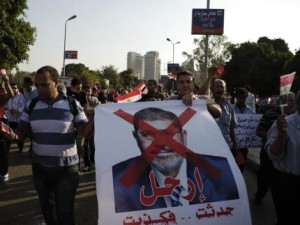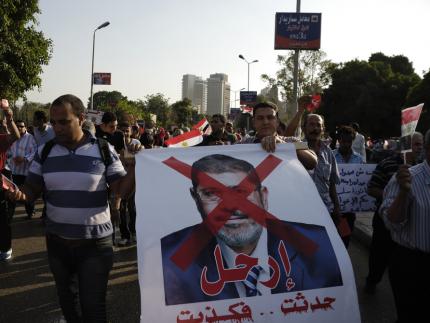 Imagine a government dominated by paranoia, convinced of conspiracies around every corner. That, in short, was the most defining aspect of the Muslim Brotherhood’s year in power in Egypt. Though the country’s first democratically elected government was overthrown in a military coup in July, the Brotherhood made its fair share of critical mistakes. It alienated the politicians essential to solving Egypt’s problems and declared war against the bureaucracy it needed to govern, all while the United States did little more than watch as its influence in the Arab world’s most important nation shrank to infinitesimal proportions.
Imagine a government dominated by paranoia, convinced of conspiracies around every corner. That, in short, was the most defining aspect of the Muslim Brotherhood’s year in power in Egypt. Though the country’s first democratically elected government was overthrown in a military coup in July, the Brotherhood made its fair share of critical mistakes. It alienated the politicians essential to solving Egypt’s problems and declared war against the bureaucracy it needed to govern, all while the United States did little more than watch as its influence in the Arab world’s most important nation shrank to infinitesimal proportions.
The Brotherhood paranoia is not born of fantasy. For most of its eight decades, the group has been hounded by the central government. The Egyptian security services assassinated its founder, constantly incarcerated its leaders, and harassed its activists. Its years as an underground organization fostered a bunker mentality that views outsiders as threats to be neutralized. Once in office, the Brotherhood’s leaders were constantly obsessed that adversaries were plotting to bring it down. This explains President Mohamed Morsi’s Brotherhood-dominated cabinets, as well as his inability to build a coalition government at the very moment when Egypt’s problems required one.
The Brotherhood’s distrust of the secularists who propped up the regime of former President Hosni Mubarakis understandable, but it is more difficult to explain its alienation of the puritanical Salafist movement. These two Islamist organizations largely share the same goals, namely, making Egypt a more pious Muslim state. But during its year in power, the Brotherhood did everything possible to estrange the Salafist al-Nour party, which finished second in the 2011–12 parliamentary elections. Al-Nour supported the controversial constitution the Brotherhood rammed through Parliament. In exchange, the Salafists hoped to get the education and economic portfolios in Morsi’s Cabinet. Instead, they felt betrayed when they were offered the insignificant environment ministry. The final blow came in February, when Morsi dismissed senior al-Nour official Khalid Alam al-Din from his post as presidential adviser. Days later, leading Salafist Yasir Burhami attacked the Brotherhood, saying it was marginalizing and slandering al-Nour. Such enmity explains why the Salafists aligned with the secular forces to topple the Brotherhood in the days leading up to the July 3rd coup.
The Brotherhood’s paranoia also led to purges of Mubarak supporters in a clumsy full-court press against the security services, the judiciary, and the intellectual establishment. It made more trouble for itself with the third especially. Egyptians revere the writers, directors, and actors who made Cairo the cultural mecca of the Arab world, and the Ministry of Culture was the last bastion of the Mubarak establishment that had not succumbed to the Islamist wave that has gripped Egypt since Anwar Sadat assumed power in 1970. Minister Farouk Hosny, a favorite of Mubarak’s wife Suzanne, had served in his post since 1987, longer than any other Cabinet official. Though best known for his May 2008 pledge to burn Israeli books, Hosny consistently angered Islamists. His ministry’s decision in 2000 to re-publish the Syrian novelist Hayder Hayder’s Banquet for Seaweed—a critique of Islam—sparked massive protests. He further enraged Islamists in November 2006, when he told the Egyptian daily Al-Masry Al-Youm that “there was an age when our mothers went to university and worked without the veil. It is in that spirit that we grew up. So why this regression?” When the Brotherhood took power, it set its sights on this pillar of the Mubarak establishment. Not surprisingly, it did so overzealously. Although it replaced Hosny with a non-Brotherhood member, Ala’a Abd al-Aziz, Aziz swiftly fired the heads of the Cairo Opera House, Fine Arts Division, and General Egyptian Book Organization. The intellectual backlash that ensued, which included a popular sit-in at the ministry building, further eroded support for the new government.
President Morsi himself created his fair share of problems as well. He originally supported a proposed IMF loan in November 2012, but pressure from the Brotherhood’s highest body, the Guidance Bureau, forced him to backtrack, hurting his credibility. Though Morsi was often captive to his Brotherhood superiors, he nevertheless went rogue when it suited him. In November 2012 he signed a presidential decree granting himself sweeping powers unchallengeable by any court. Shortly thereafter, he delivered a speech viciously attacking his adversaries, signaling his unwillingness to tolerate any opposition. His aides later confided that Morsi’s statements were unscripted and that he had expunged the more conciliatory remarks in the prepared text.
The generals holding power in Egypt were probably willing to overlook the Brotherhood’s missteps. Nor did the Brotherhood’s penchant for infusing religion into politics overly perturb Defense Minister Abdul-Fattah el-Sisi. A scion of a conservative Muslim family, Sisi’s his uncle was a member of the Brotherhood and his wife wears a veil. All he and the other military brass wanted was enough stability to lift the country out of its economic and social doldrums. The Brotherhood’s bumbling, however, seemed to be making that impossible. The final straw appears to have been Morsi’s participation at a June 15th event organized by Islamist factions in support of the Syrian revolution. Among the speakers who irked the no-fuss generals was the firebrand Safwat Hijazi. His claim of sending weapons to Syrian rebels for over a year rang the alarm bells. The generals were enraged that Morsi sat silent as speaker after speaker whipped the crowd into a jingoistic frenzy as it chanted “To Jerusalem, we are going!”
As the military plotted its coup, senior American officials warned them in several conversations that Washington would not support it. The generals listened politely but were in no mood to heed their cautionary counsel, favoring the will of the street over American diktats.
In truth, Washington’s influence in Egypt has always been overstated. Cairo has traditionally marched to its own drum, only taking note of Washington’s advice when it dovetailed with its own interests. Mubarak’s willingness to skirmish with Libyan leader Muammar Qaddafi in the 1980s stemmed from personal animosity rather than realpolitik. In the 1990s, when the international community isolated Qaddafi in an effort to get him to give up two Lockerbie bombing suspects, Mubarak was one of the few Arab leaders willing to meet with him. Egypt is also believed to have conspired with Libya to kidnap prominent Libyan dissident Mansour al-Kikhia in Cairo in 1993 and render him to Tripoli. Remittances by Egyptian workers in Libya were far more important than the need to placate Washington.
America’s clout in Egypt has been little understood by the Washington elite especially. The approximately $72.2 billion in aid the United States has doled out to Egypt since 1973 was never really meant to transform the country into an American satellite. Instead, the annual installments were ransoms paid to ensure Egypt would not participate in an Arab-Israeli war and to secure intelligence cooperation. Just as importantly, aid was a signal to other Arab Soviet allies that only Washington could deliver their lands occupied by Israel and the funds needed to build their economies. But with the demise of the rejectionist states, this raison d’êtrehas vanished. Iraq’s Saddam Hussein and Libya’s Qaddafi are dead. The Palestine Liberation Organization mended fences with Washington and Syria is adrift in a civil war its leaders will never recover from.
The collapse of the Mubarak regime has similarly devastated security collaboration. American intelligence services would never dare run agents in a country where Mubarak’sconsigliere and spy chief Omar Suleiman laid his treasure chest open before them.
As the Brotherhood desperately tries to patch up relations with an alienated society and Washington quixotically seeks to reassert an influence it barely had before, both are trying to figure out what went wrong. And as they do, the Arab world’s most important nation sinks further into an abyss that portends more turmoil for a region that has known nothing but misfortune.
Barak Barfi is a research fellow at the New America Foundation. He recently returned from Egypt, where he spent time with Muslim Brotherhood supporters at the Raba’a al-Adawiyya mosque in Cairo.
Photo Credit: Mohamed Elsayyed / Shutterstock.com







